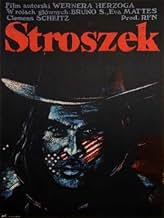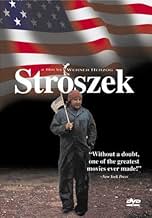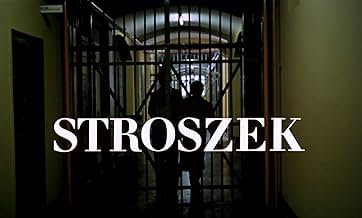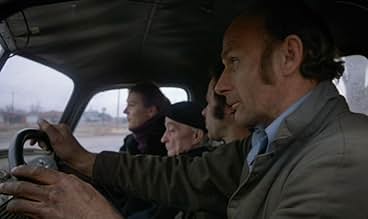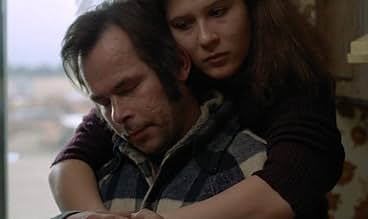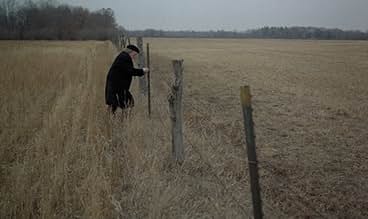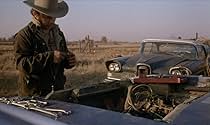En Berlín, un hombre alcohólico que acaba de salir de prisión se une a su anciana amiga y a una prostituta en un sueño decidido de salir de Alemania y buscar una vida mejor en Wisconsin.En Berlín, un hombre alcohólico que acaba de salir de prisión se une a su anciana amiga y a una prostituta en un sueño decidido de salir de Alemania y buscar una vida mejor en Wisconsin.En Berlín, un hombre alcohólico que acaba de salir de prisión se une a su anciana amiga y a una prostituta en un sueño decidido de salir de Alemania y buscar una vida mejor en Wisconsin.
- Dirección
- Guionista
- Elenco
- Premios
- 2 premios ganados y 2 nominaciones en total
- Scott
- (as Scott Mc Kain)
- Doctor
- (as Dr. Vaclav Vojta)
- Turk prisoner
- (as Yücsel Topcugürler)
- Trucker Pimp
- (sin créditos)
- Dirección
- Guionista
- Todo el elenco y el equipo
- Producción, taquilla y más en IMDbPro
Opiniones destacadas
Strange enough, the kitschy surreality of this film's music (a good example will be that iced lake radar search sequence) reminds me strongly of those 70's Classic Taiwanese "Beach" Dramas. You know, the kind where a pair of arms-outstretched love birds would run in slomo towards each other via opposite ends of a sandy seashore? I know, the cultural reference may be lost to non-Chinese readers and I apologise. But yes, this flick stirs and stimulates my free associative imagination with wild and insane glee. I kid you not, people. I kid you not.
However, major credits need be given to the lucidity and forceful presence of one Bruno S.
Sample below quote.
The Bruno to Eva: "And now comes the question. All my friends waited for me, but this is my best friend....my "Black Friend"(a piano). What's going to happen to my friend when Bruno goes dead someday? Where are these things and these instruments going to end up? What's going to happen to them. Someone must answer this for me." (And then, they just stared at each other, throughout and after.....)
Above affecting sequence punctuated the bittersweet vulnerability of one Bruno S. As a simple, slightly challenged man-child, Bruno had very limited human relationships all his life. As such, he guilelessly transfers his genuine feelings onto "placebo" objects. But despite of his checkered past (years of physical abuse and institutional upbringing), this socially inadequate man ably exudes generosity, kindness and unguarded honesty. Given half a chance, he will just as likely shower his unconditional love onto those whom he cares for, namely Eva. (As was shown in one scene set to the haunting tinkles of Moonlight Sonata). All in, Bruno is thus an exceptionally good man. But will there yet be more to this Bruno than meet the eyes? I dunno....
Throughout this film, I am captivated by Bruno's earnest glow; so refreshingly tender and devoid of artifice. In reaction to his search for meaning in life, love and other myriad mysteries (like "birds confiscators" or "speed-talking" men - don't ask.), Bruno's expressive face never lies. I felt immensely privileged to share in his bliss (or despair) at any given points in time. This fascinating creature tugged at my strings more often in this movie than the combined twitches of so many affected actors out there. I friggin' love this charming dude and hence, I cannot help but root for the guy. You go, Bruno!
Like the best of Herzog's works, Stroszek boasts of many scratch head-worthy moments. (Especially considering my having seen the Enigma of "Heart of Glass".) But these pecularities only serve to propel my viewing experience into mystical realms. For buried within its seemingly artful surfaces, lies aching balms of "cinematic capsules". They will randomly burst and engulf the inclined and willing. They will seep into one's consciousness and never let you go. I hence don't think I can ever erase the wonderous memories of those stolen moments already, from "Peddling Sabine" to "Infant Gymnastics", from "Not 4, but 5" to "$32". Most infamously, how can I not mention that "Dancing Chicken"? Brilliant!
At this point, I will like to urge all to venture forth into Herzog's film universe. For if you're willing, or foolhardy enough to take that plunge, you may yet discover a film like Stroszek to be ceaselessly beautiful and effortlessly moving.
The scene with the premature baby and the doctor is one of the greatest I've ever seen. It is just amazing, the character of that tiny infant, and shows Stroszek the fundamental power that he lacks, the tenacious nature of humanity to hold onto not only fellow human beings, but also to life itself.
The coin-operated live animals in the end represent not only cruelty and lack of compassion, but the obsessiveness of the American pursuit of entertainment. I personally felt more compassion for these creatures as victims of a system than I did for Bruno, who was pretty much doomed before he came to America.
The running commentary that Herzog has recorded for the recent DVDs of his films are among the most interesting and engaging I've heard, and they're one of the reasons I especially appreciate the DVD medium. That's not to say that he lets the literal-minded viewer off the hook by providing handy explanations for every peculiar image or bit of dialog. When asked what a certain image or phrase signifies, he will sometimes simply say that he cannot explain it. But I find it fascinating to watch a scene, and then scan back and listen to his comments about the location, actors, technical details, and yes, even sometimes the intended effect of a puzzling image. Many of the people seen in his films are non-actors, people he simply ran into, found interesting, and intuitively knew would be effective on film. Some of the players in Herzog's films are the very people that most directors would chase from their set with security guards, but he sees something interesting in them, and finds a way to tap into it. I can't help liking the man for that. Some people have suggested that his use of the unfortunate Bruno S. as a film actor amounted to some sort of exploitation. But it seems to me that his befriending of Bruno, and his artful and patient use of him as a film actor, must have given Bruno some sense of the dignity and worth as a unique human being that was denied him for most of his life. If this means nothing to you, and you don't know anything about Bruno S., the commentary tracks on either "Stroszek" or "The Enigma of Kaspar Hauser" explain his background nicely. It's a remarkable story.
If you're unfamiliar with Herzog's work, he has done some especially exotic films with the volatile actor Klaus Kinski. "Cobra Verde" is a particular favorite of mine. But his films do not have the relentless pace or hyperactive editing typical of mainstream American films. They are unforgiving of those with short attention-spans, so be forewarned.
The film handles the story of former asylum inmate Bruno S. (THE ENIGMA OF KASPAR HAUSER) as a Berlin street singer (in a role where he basically plays himself), who joins with his prostitute girlfriend Eva (Eva Mattes) and ageing eccentric friend Scheitz (Clemens Scheitz) to embark on a memorable journey, leaving modern Berlin, for the golden opportunities of America. The 'promised land' is represented by the dreary, austere town of Railroad Flats in rural Wisconsin, where they settle in a mobile home bought on credit, but it turns out America is not gonna fulfill their dreams that easily.
Shot in winter, Berlin is shown as a cold, forbidden and lacklustre place. Not a ray of sunshine. The dark facades of the battered apartment blocks, downlit bars filled with smoke and shabby characters, the only goal the folks in Bruno's world seem to have, is merely make the best of things.
Often read as a critique of how capitalist American society destroys the individual, Herzog sees the film as less a critique of the United States than as "a eulogy" in the wake of the American dream, for such shattered hopes could develop in virtually any country (see "Herzog on Herzog", p. 144). He does throw in some of the eccentricities of American life, but above all, it's a somewhat surreal account of three simple folks, short-changed in life, desperately trying to make ends meet. From the start it's clear that these three are made for each other. They simply do not fit in any stratum of society really. They're too fragile for the world of pimps and low lives that formed the background of their lives in Berlin. Although not dumb, Bruno is too half-witted to be taken seriously by most people. Eva's background is not fully explained, but she's emotionally fragile and dependent, while elderly Scheitz's chances to get ahead in life seems to lay in the past.
It's a bleak and uncompromising film, this tragicomic account of this odd trio in pursuit of a better life outside the dreary confinements of Berlin's lower casts of society, but it's so intensely moving and honest with its subjects, that alone is something to admire.
Camera Obscura --- 9/10
This intensely moving and satisfying film which begins in Germany and winds up in Wisconsin is solid through and through. There's not a weak moment or weak element to be found. The acting, especially by Bruno S., is completely unaffected and without over-stylization (there is, perhaps, a reason for this - they aren't acting, simply being). The story itself deals with melodramatic elements without steering into soap opera territory and the film's ideology is not black in white. There's subtlety and complexity to the ideas put forth in this film about America, Germany, human beings, life, etc. Moreover, Stroszek avoids beating the audience's brains with its ideas; Herzog presents them in the context of the story, smoothly integrated.
And then there's the beautiful photography, particularly of the American Midwest; Herzog and his cameramen capture perfectly the cold, stark, desolate magnificence of the upper-Plains. To draw a weird comparison, the photography here is the equivalent of Husker Du's New Day Rising - crisp, harsh, and gorgeous simultaneously.
Stroszek also has a justifiably well-known ending, both surreal and completely sensible. Though any other director would be unable to top an ending such as that in Aguirre (the slumped conqueror, floating on a monkey-covered raft), Herzog does just that here.
Truly, if you have not seen any Herzog, this is a great place to start; then go see Aguirre, Fitzcarraldo, Nosferatu, Woyczek, and Invincible. The man is brilliant and I await with bated breath Grizzly Man, his new project.
¿Sabías que…?
- TriviaThe entire crew disliked the last sequence so much that director Werner Herzog had to shoot it by himself. Incidentally, he considers this scene the best he has filmed.
- ErroresAfter Bruno, Eva and Scheitz buy a used car, they drive out to Wisconsin. The camera's shadow is visible on the car as Eva drives.
- Citas
[last lines]
Deputy Sheriff: We have a 10-80 out here, a truck on fire, we have a man on the lift. We are unable to find the switch to turn the lift off, can't stop the dancing chickens. Send an electrician, we're standing by.
- ConexionesFeatured in Century of Cinema: Die Nacht der Regisseure (1995)
- Bandas sonorasOn the Way Down to Phoenix
Written and Performed by Chet Atkins
Selecciones populares
- How long is Stroszek?Con tecnología de Alexa
Detalles
- Fecha de lanzamiento
- País de origen
- Idiomas
- También se conoce como
- La balada de Bruno S
- Locaciones de filmación
- Plainfield, Wisconsin, Estados Unidos(hold up on North Street)
- Productoras
- Ver más créditos de la compañía en IMDbPro
Taquilla
- Total a nivel mundial
- USD 3,451

